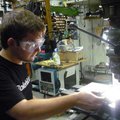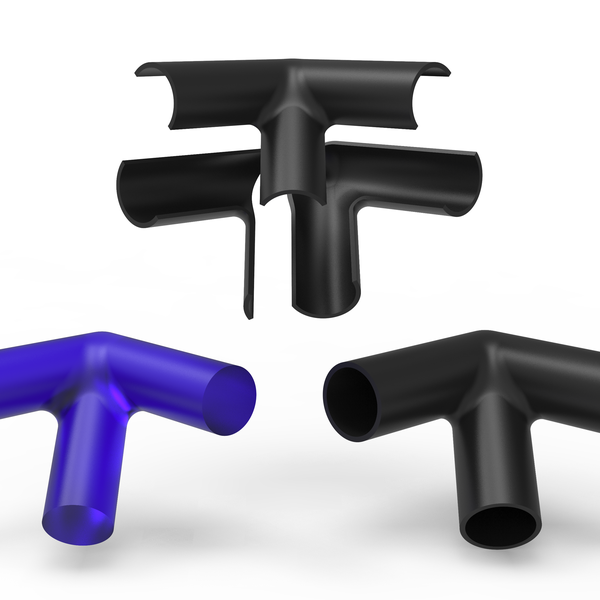(https://certification.oshwa.org/process.html)
 @Michael Weinberg And isn't the new US law that it is the first "inverntor" to patent not "person". if you are the first to put it in the public domain isn't that prove you are the inventor
@Michael Weinberg And isn't the new US law that it is the first "inverntor" to patent not "person". if you are the first to put it in the public domain isn't that prove you are the inventor
 @Anthony Kouttron that's right. When you think about open source hardware, thing about four parts: hardware, software, documentation, and TM
@Anthony Kouttron that's right. When you think about open source hardware, thing about four parts: hardware, software, documentation, and TM
 What if *you* released something to public domain. Can *you* then still go and patent that same thing?
What if *you* released something to public domain. Can *you* then still go and patent that same thing?
 but putting it in the public domain practically bans you from patenting it
but putting it in the public domain practically bans you from patenting it
 when you openly license the hardware, software, and documentation you are not also licensing the trademark
when you openly license the hardware, software, and documentation you are not also licensing the trademark
 @Daren Schwenke I think you have one year
@Daren Schwenke I think you have one year
 @John Loefler I think I remember seeing that too
@John Loefler I think I remember seeing that too
 @David Troetschel I believe the rule is 1 year after public disclosure
@David Troetschel I believe the rule is 1 year after public disclosure
 think of the trademark as being where you go to start answering the question "who is responsible for this board that just caught fire?"
think of the trademark as being where you go to start answering the question "who is responsible for this board that just caught fire?"
 the first place it should point you to is the person/company that actually manufactured the thing, not the person/company that came up with the design
the first place it should point you to is the person/company that actually manufactured the thing, not the person/company that came up with the design
 which makes me wonder, do disclaimers work for hardware designs as well?
which makes me wonder, do disclaimers work for hardware designs as well?
 if I release a design of something, can they come knocking on my door when it explodes in their hands?
if I release a design of something, can they come knocking on my door when it explodes in their hands?
 to step back, the reason that all of this matters is because when people say that they want to 'open source their hardware' we want to make sure that they have not inadvertently left barriers to future users because they did not license things properly
to step back, the reason that all of this matters is because when people say that they want to 'open source their hardware' we want to make sure that they have not inadvertently left barriers to future users because they did not license things properly
 you can state warnings and such if it makes you feel better but it can't really stop someone from trying
you can state warnings and such if it makes you feel better but it can't really stop someone from trying
 disclaimers never hurt (that's why you see them everywhere) but there are some things you can't disclaim away.
disclaimers never hurt (that's why you see them everywhere) but there are some things you can't disclaim away.
 but if all that can´t be enforced, does it even matter for hardware?
but if all that can´t be enforced, does it even matter for hardware?
 that's what worries me
that's what worries me
 they can be enforced, it just depends on the context
they can be enforced, it just depends on the context
 there are questions about how responsible a designer is if they just release digital files (as opposed to create a board and ship it)
there are questions about how responsible a designer is if they just release digital files (as opposed to create a board and ship it)

 with 3d priting and such, that becomes a moot question
with 3d priting and such, that becomes a moot question
 also if you did something totally negligently like design the board to explode whenever someone turns it on a disclaimer probably won't save you
also if you did something totally negligently like design the board to explode whenever someone turns it on a disclaimer probably won't save you
 @Anthony Kouttron totally!
@Anthony Kouttron totally!
 They are complimentary.
They are complimentary.
 "Licensed under CERN OHL v.1.2 or later http://ohwr.org/cernohl
"Licensed under CERN OHL v.1.2 or later http://ohwr.org/cernohl
Creative Commons LicenseGeometer by David Troetschel is licensed under a Creative Commons Attribution-ShareAlike 4.0 International License.
Permissions beyond the scope of this license may be available at dtroetschel@hotmail.com.
Open Source Hardware Association Certification https://certification.oshwa.org/us000157.html"
 this is for Geometer
this is for Geometer

https://hackaday.io/project/161645-geometer
Geometer
Geometer is a new design tool and form language mediating between the physical and digital world. It is made to be understandable, communicable and dynamic. -No black box, encouraging active participation and goal oriented design. -Components open a channel for dialogue around relationships and patterns.
 makes me think we never see exploding board stories on HaD :(
makes me think we never see exploding board stories on HaD :(
 The OSHWA certification says that the hardware complies with the open source hardware definition. One of the elements of the definition is to license the hardware in a way that others can build upon it. The CERN licenses are great ways to comply with that requirement
The OSHWA certification says that the hardware complies with the open source hardware definition. One of the elements of the definition is to license the hardware in a way that others can build upon it. The CERN licenses are great ways to comply with that requirement

 CERN is one of the recommended hardware licenses in the certification application https://application.oshwa.org/apply
CERN is one of the recommended hardware licenses in the certification application https://application.oshwa.org/apply
 and the CERN team is doing a great job with those licenses
and the CERN team is doing a great job with those licenses

 exploding chips on boards we have a plenty. Well I do at least.
exploding chips on boards we have a plenty. Well I do at least.
 interesting! i didn't know CERN had their own licence
interesting! i didn't know CERN had their own licence
 Do you have any thoughts on the new CERN 2.0 that is in draft?
Do you have any thoughts on the new CERN 2.0 that is in draft?
 I think CERN 2.0 is a big leap forward and I am excited for them to finalize it
I think CERN 2.0 is a big leap forward and I am excited for them to finalize it
 that website is broken, had a lot of "check_box_outline" strings all over it instead of checkboxes...
that website is broken, had a lot of "check_box_outline" strings all over it instead of checkboxes...
 Let me also take this opportunity to say that the call for speakers for the Open Hardware Summit is open.... (https://2020.oshwa.org/apply/)
Let me also take this opportunity to say that the call for speakers for the Open Hardware Summit is open.... (https://2020.oshwa.org/apply/)
 @de∫hipu which site?
@de∫hipu which site?
![]() 12. License Must Be Technology-Neutral
12. License Must Be Technology-Neutral
No provision of the license may be predicated on any individual technology, specific part or component, material, or style of interface or use thereof. -> would think this to be intractable and not practical. Have done many a design with components that were single-sourced; and/or where the unique physical design elements were required to functions; and/or where the code was limited to a specific distro. We are freakin hackers and engineers. If you want cool stuff out there in the wild, where the designer has some level of indemnity, you will probably need to re-think this clause.
 Is the LHC, licenced under the CERN licence though i wonder ;)
Is the LHC, licenced under the CERN licence though i wonder ;)

https://hackaday.io/project/167303-portable-professional-fume-extractor
 @Michael Weinberg that "apply" link — probably some javascript I have blocked that failed to do graceful degradation
@Michael Weinberg that "apply" link — probably some javascript I have blocked that failed to do graceful degradation
 the https://application.oshwa.org/apply site is working fine for me. I do have JavaScript enabled.
the https://application.oshwa.org/apply site is working fine for me. I do have JavaScript enabled.
 what about appropriate licensing on the design files for objects? Like on one hand you have openscad code which generates the model, on the other hand you have the model itself like an stl, and in the end you get a physical object.
what about appropriate licensing on the design files for objects? Like on one hand you have openscad code which generates the model, on the other hand you have the model itself like an stl, and in the end you get a physical object.
 @Brian that provision does not mean that the components cannot be single sourced. Only that the license can't be contingent on using components from a specific source
@Brian that provision does not mean that the components cannot be single sourced. Only that the license can't be contingent on using components from a specific source
 (not important, sorry)
(not important, sorry)
 @Daren Schwenke the stl would be a derieved work from the code, no?
@Daren Schwenke the stl would be a derieved work from the code, no?
 @anfractuosity unfortunately not. Right now they are using the license for some cool high speed networking equipment https://white-rabbit.web.cern.ch/
@anfractuosity unfortunately not. Right now they are using the license for some cool high speed networking equipment https://white-rabbit.web.cern.ch/
 @Michael Weinberg should you sign you name to hardware projects design files if you want to keep it open?
@Michael Weinberg should you sign you name to hardware projects design files if you want to keep it open?
 @de∫hipu I don't know. I've just guessed and picked until now..
@de∫hipu I don't know. I've just guessed and picked until now..
 Not sure if this has been brought up, but is there a "best practice" on the exchange of design materials. We have a number of boards developed in Allegro because developers know how to use it to get the right signal integrity, but I'd like to make sure people can bring it into other tools. Is there a best practice?
Not sure if this has been brought up, but is there a "best practice" on the exchange of design materials. We have a number of boards developed in Allegro because developers know how to use it to get the right signal integrity, but I'd like to make sure people can bring it into other tools. Is there a best practice?
 @Daren Schwenke We recommend CC licenses for the files themselves. Keep in mind that those licnenses only control copying the documentation. They usually will not control making the thing that is documented
@Daren Schwenke We recommend CC licenses for the files themselves. Keep in mind that those licnenses only control copying the documentation. They usually will not control making the thing that is documented
 @Michael Weinberg intriguing thanks
@Michael Weinberg intriguing thanks
 @John Loefler I don't know that it has a huge impact. It will allow people to give you credit if they use the design, which can be nice sometimes
@John Loefler I don't know that it has a huge impact. It will allow people to give you credit if they use the design, which can be nice sometimes
 @Anthony Kouttron if you go through the certification process you can be sure that it is open and matches the definition
@Anthony Kouttron if you go through the certification process you can be sure that it is open and matches the definition
 @Michael Weinberg It doesn't prevent anyone from using it though, right?
@Michael Weinberg It doesn't prevent anyone from using it though, right?
 the process is free....
the process is free....
![]() Brian that provision does not mean that the components cannot be single sourced. Only that the license can't be contingent on using components from a specific source. -> non sequitur. Some designs will, in fact, (regardless of being poor engineering practice) require use of a component that is available from single manufacturer. Again, we are freakin engineers. Allow us to release stuff where others may have to 'hack around' the original design. That is life in the big engineering lab, kids.
Brian that provision does not mean that the components cannot be single sourced. Only that the license can't be contingent on using components from a specific source. -> non sequitur. Some designs will, in fact, (regardless of being poor engineering practice) require use of a component that is available from single manufacturer. Again, we are freakin engineers. Allow us to release stuff where others may have to 'hack around' the original design. That is life in the big engineering lab, kids.
 @John Loefler not in and of itself
@John Loefler not in and of itself
 most microcontrollers are only produced by one manufacturer, for example, rarely you have drop-in replacements
most microcontrollers are only produced by one manufacturer, for example, rarely you have drop-in replacements
 I'm curious if there's a category or terminology for something that's a half-step between open and closed hardware. Where you release the knowledge, design process, and enough documentation for someone to be able to re-create your device, but not enough that they can very easily copy it. For example: releasing the schematic for a PCB but not native design files or gerbers. Releasing 2D drawings of mechanical parts, but not native CAD or step files. The idea being to still encourage learning while having a minimal amt of protection in place for your own sales (at least requiring some amount of effort for someone else to manufacture your product).
I'm curious if there's a category or terminology for something that's a half-step between open and closed hardware. Where you release the knowledge, design process, and enough documentation for someone to be able to re-create your device, but not enough that they can very easily copy it. For example: releasing the schematic for a PCB but not native design files or gerbers. Releasing 2D drawings of mechanical parts, but not native CAD or step files. The idea being to still encourage learning while having a minimal amt of protection in place for your own sales (at least requiring some amount of effort for someone else to manufacture your product).
 @Alpenglow Industries hmmm....
@Alpenglow Industries hmmm....
 @Brian there are two issues at play here. You are allowed to use single sourced elements in your design (as long as those sources are generally available without having to sign an NDA). What you cannot do is say that "my license is contingent on using materials from X source". That is trying to avoid a situation where someone says "here is my open hardware but if you do not purchase all of the parts from me I will sue you for copyright infringement."
@Brian there are two issues at play here. You are allowed to use single sourced elements in your design (as long as those sources are generally available without having to sign an NDA). What you cannot do is say that "my license is contingent on using materials from X source". That is trying to avoid a situation where someone says "here is my open hardware but if you do not purchase all of the parts from me I will sue you for copyright infringement."
 @Alpenglow Industries I'd say such a thing most definitely exists, but is not "open hardware"
@Alpenglow Industries I'd say such a thing most definitely exists, but is not "open hardware"
 I consider schematics and 2d drawings to be basic documentation...
I consider schematics and 2d drawings to be basic documentation...
 the definition is meant to get a reasonable minimum.
the definition is meant to get a reasonable minimum.
 @Alpenglow Industries @Jason Kridner +1
@Alpenglow Industries @Jason Kridner +1
 pretty much anything should come with those
pretty much anything should come with those
 (it used to be that way, when you bought a TV, you got the schematic with it)
(it used to be that way, when you bought a TV, you got the schematic with it)
 most companies have some secret sauce outside of their patents, thats the only way to really keep something safe.
most companies have some secret sauce outside of their patents, thats the only way to really keep something safe.
 sure, there is a bit of a sliding scale as there's always some practical limit to openness, but, again, some minimal level that offers some chance of success.
sure, there is a bit of a sliding scale as there's always some practical limit to openness, but, again, some minimal level that offers some chance of success.
 @Michael Weinberg Do you have a process / set of licenses that you recommend for people wanting to a) make open hardware, b) make some money on the hardware, while trying to reduce the likelihood of other people making your product cheaper and reducing your income? I was wondering about some kind of royalty baked into the license?
@Michael Weinberg Do you have a process / set of licenses that you recommend for people wanting to a) make open hardware, b) make some money on the hardware, while trying to reduce the likelihood of other people making your product cheaper and reducing your income? I was wondering about some kind of royalty baked into the license?
 @de∫hipu that is one of the things I like about the certification process. We have some review guidelines, but we obviously do not have experts in every area. If we certify hardware and later on someone comes back to say "hey, this is missing documentation X which is really important in this area" we will work with the creator to make sure everything is updated. It turns it into a collaborative process
@de∫hipu that is one of the things I like about the certification process. We have some review guidelines, but we obviously do not have experts in every area. If we certify hardware and later on someone comes back to say "hey, this is missing documentation X which is really important in this area" we will work with the creator to make sure everything is updated. It turns it into a collaborative process
 do you have to list the exact part numbers and manufacturers, or just the circuit diagram and PCB layout? In the definition at https://www.oshwa.org/definition/ I don't see this requirement
do you have to list the exact part numbers and manufacturers, or just the circuit diagram and PCB layout? In the definition at https://www.oshwa.org/definition/ I don't see this requirement
 @David Troetschel @Jason Kridner I know that wouldn't be fully open. It's hard to contemplate one big jump into fully open hardware.
@David Troetschel @Jason Kridner I know that wouldn't be fully open. It's hard to contemplate one big jump into fully open hardware.
 The rule we landed on for the certification is that you need to make the "creator contribution" open. That means that everything that is in your control to open needs to be open. . But if you buy patented products from a supplier you do not have the ability to 'open' those parts. So as long as you document them and they are generally available you are ok.
The rule we landed on for the certification is that you need to make the "creator contribution" open. That means that everything that is in your control to open needs to be open. . But if you buy patented products from a supplier you do not have the ability to 'open' those parts. So as long as you document them and they are generally available you are ok.
 @de∫hipu there is 'right to repair' in the EU and US where household appliances will have to be delivered with repair documentation, see https://www.bbc.com/news/business-49884827
@de∫hipu there is 'right to repair' in the EU and US where household appliances will have to be delivered with repair documentation, see https://www.bbc.com/news/business-49884827
 @Alpenglow Industries Just use 01005 Resistors and Caps no one could copy that
@Alpenglow Industries Just use 01005 Resistors and Caps no one could copy that
![]() "there are two issues at play here. You are allowed to use single sourced elements in your design (as long as those sources are generally available without having to sign an NDA). What you cannot do is say that "my license is contingent on using materials from X source". That is trying to avoid a situation where someone says "here is my open hardware but if you do not purchase all of the parts from me I will sue you for copyright infringement." " -> ok this sounds reasonable. But I am a simple-minded engineer, and my interpretation of this clause is still problematic. But keep on truckin - this could be a 'really good thing'. Live long and phosphor; abuse The Farce.
"there are two issues at play here. You are allowed to use single sourced elements in your design (as long as those sources are generally available without having to sign an NDA). What you cannot do is say that "my license is contingent on using materials from X source". That is trying to avoid a situation where someone says "here is my open hardware but if you do not purchase all of the parts from me I will sue you for copyright infringement." " -> ok this sounds reasonable. But I am a simple-minded engineer, and my interpretation of this clause is still problematic. But keep on truckin - this could be a 'really good thing'. Live long and phosphor; abuse The Farce.
 :)
:)
 @Matthias Tarasiewicz but that's not for the end users, sadly
@Matthias Tarasiewicz but that's not for the end users, sadly
 @John Loefler Ha! Including me!
@John Loefler Ha! Including me!
 @Frank Buss good question. The rule of thumb is that you need to give enough information so that someone can figure out how to source them. You do not need to disclose your specific supplier and/or contracts if you do not want to
@Frank Buss good question. The rule of thumb is that you need to give enough information so that someone can figure out how to source them. You do not need to disclose your specific supplier and/or contracts if you do not want to
 @Brian thanks!
@Brian thanks!
 If you think of most projects @Alpenglow Industries they have some unintentional secret sauce just because of their complexity. https://certification.oshwa.org/us000157.html
If you think of most projects @Alpenglow Industries they have some unintentional secret sauce just because of their complexity. https://certification.oshwa.org/us000157.html
 @Alpenglow Industries things can be good even if they are not fully open!
@Alpenglow Industries things can be good even if they are not fully open!
 e.g. I saw an open source hardware circuit with a 32.768 kHz crystal, but it didn't mention which type, and it wouldn't work if it were 7 pF load capacitance instead of 12 pF
e.g. I saw an open source hardware circuit with a 32.768 kHz crystal, but it didn't mention which type, and it wouldn't work if it were 7 pF load capacitance instead of 12 pF
 yeah, it's impossible to specify everything
yeah, it's impossible to specify everything
 OSHWA thinks that openness is a great tool for many situations, but it is not always the right choice for everyone. That being said, if you take a step in that direction you may find that it is better than you thought.....
OSHWA thinks that openness is a great tool for many situations, but it is not always the right choice for everyone. That being said, if you take a step in that direction you may find that it is better than you thought.....
 would be nice if the license would require any information to reproduce it yourself, as GPL does for software
would be nice if the license would require any information to reproduce it yourself, as GPL does for software
 but its nice to give feedback and answer questions if you go the open route, it's advertising of a sort
but its nice to give feedback and answer questions if you go the open route, it's advertising of a sort
 I have a new project that is fully open source. I'll submit it in the coming days for OSHWA certification.
I have a new project that is fully open source. I'll submit it in the coming days for OSHWA certification.
 Congrats @Leon Anavi
Congrats @Leon Anavi

 Dan Maloney
Dan Maloney
Discussions
Become a Hackaday.io Member
Create an account to leave a comment. Already have an account? Log In.